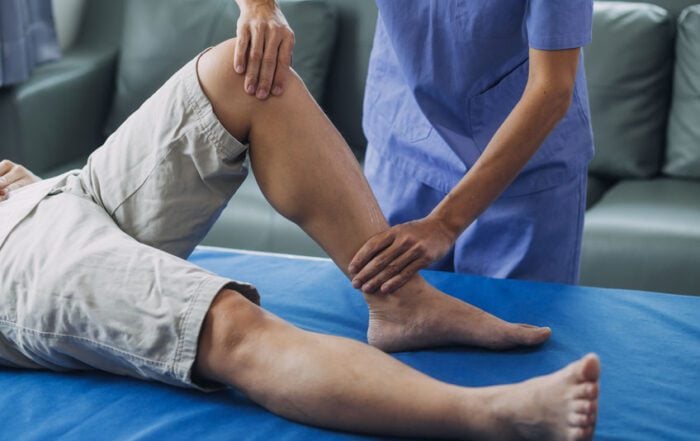Broken Bones And Surgery
Not all fractures require surgery. Open reduction is used to treat minor bone breaks that can be set with casts or splint. Fractures that are unstable or not in a good position to heal naturally may require surgery to heal correctly. Internal fixation uses stabilizing devices such as metal plates or rods to secure the bones back in place and allow for proper healing. Most fractures requiring supporting devices will undergo open reduction and internal fixation (ORIF) surgery.

Breaks requiring surgery
The location of the injury is a significant factor in determining if surgery is needed. Bones don’t all react the same when broken, and specific fracture patterns heal better with surgery. The fractured pieces of bone may require help to stay together. If the break goes through a joint, surgery may be the only option for proper healing. Compound fractures, which occur where the bone breaks through the skin, almost always require surgery. If the break goes across or touches a childís growth plate, surgery may be the only option to avoid long term damage. Even bones that have begun to heal may require new alignment.
What to expect during recovery
Improper healing can impact future mobility and daily activities. Joints, ankles, and wrists are the most common areas of the body requiring surgery after a fracture. The operation can take several hours, and recovery takes 6-8 weeks. The risks of bone repair surgery are rare and include blood clots, infection, allergic reactions, and abnormal bleeding.
Treatment options
Fractured bones can be set through closed or open reductions. Closed reduction involves setting the bone with a cast or splint; no surgery is needed. Open reduction involves repositioning the bones through surgery. Bones that have initially been set with a closed reduction may require repositioning with open reduction surgery. Internal fixation is the use of mechanical devices to set and stabilize the bones. Metal screws, pins, plates, or rods used to hold the bone pieces together can be temporary or permanent.
ORIF surgery
Severe breaks or compound fractures will often require open reduction and internal fixation (ORIF) surgery. ORIF surgery is performed in two parts. First, the bone is set through open reduction. Next, internal fixation is performed to place stabilizing devices on the bone. Stabilizing mechanisms range from metal screws to specialized medical glue. Most ORIF surgeries are emergencies and performed under full anesthesia. After the bone has been set and stabilized, the incision will be closed with staples or stitches. The affected body part will be placed in a cast, brace, or sling. The length of the hospital stay will depend on the severity of the injury and type of ORIF surgery. The patient should plan on spending between 1-7 days in the hospital. Recovery will involve a combination of rest, pain medication, and physical therapy.
Is surgery needed?
Bones that cannot be reset and heal in a cast will most likely require surgery. Open reduction and internal fixation surgery (ORIF) will utilize metal rods, screws, plates, and even glue to stabilize the fractured bone. The stabilizing devices may be permanent or temporary but will give the weakened bone structure and allow for better mobility during the healing process. Consult a healthcare provider to learn more about surgical options.
Recent Posts
What To Do About Hip Pain: Is It Time To See An Orthopedic Surgeon About Labral Repair?
Hip pain should not be overlooked, as the issue could be a labral tear. Symptoms like pain and instability require an orthopedic surgeon’s assessment.
ACL Repair: Will You Have Range Of Motion With Your Knee After Recovery & Physical Therapy?
After an ACL injury, ROM can be negatively affected. ACL repair surgery helps restore function, but physical therapy is essential to ROM.
Arthroscopy: What Are The Benefits Of This Minimally Invasive Outpatient Orthopedic Procedure?
Arthroscopy can help diagnose or treat joint conditions. Benefits of the MIS include faster recovery, less pain, and fewer scars.
Posterior Interbody Lumbar Fusion: What Are The Benefits Of PLIF For People With Back Pain?
People with chronic back pain may benefit from posterior interbody lumbar fusion surgery. PLIF can reduce pain and improve stability.
“I liked that it was so clean. Every staff member was pleasant and easy to talk with.”
“All staff were wonderful.”
“Dr. Dedhia made everything clear and even scheduled an early follow-up appt so I could get back to work sooner.”
“No severe pain – Just a little discomfort – I was asked several times during procedure if I was OK – they showed genuine concern for my well being.”
“Rebecca was amazing. I have always had trouble in the past with getting an IV started. I told Rebecca I was concerned about it. She got it on the 1st try – no digging in my arm and NO bruising the next day.”
“Amazing nurses, very caring and friendly and put both me and my son at ease.”
“The staff was very polite, they were excellent. They explained exactly what was going on.”
“The STAFF from the moment you walk in were the nicest people I’ve encountered at a medical facility.”
“Efficiency of the staff. Courteous, friendly and caring attitude. Excellent office staff. Pleasant surroundings.”
“Experience was amazing. The nurses my son needed at this time couldn’t have been chosen any more perfect. They were supportive and understanding, patient and just great human beings.THANK YOU KINDLY ”
“The nurses were very nice and caring!”
“Dr. Best…is the best!”
“I can’t say enough about Marcia and the entire team. The care I received was well beyond anything I could have expected.”
“Everyone was concerned with my comfort.”
“NO wait time, RN Rebecca answered all questions prior to my visit by phone and again answered all questions and concerns while prepping me.”
“Anesthesia staff was outstanding!”
“I liked that it was so clean. Every staff member was pleasant and easy to talk with.”
“Everyone was friendly and the place was very clean.”
“Everyone was friendly and the place was very clean.”
“The staff was great, especially Mary and Marcia. Marcia was extremely helpful post-op and made sure I was comfortable and well-cared for.”
“Marcia and staff were excellent and genuinely cared for my well being. Wish I could have taken them home.”
“Marcia and staff were excellent and genuinely cared for my well being. Wish I could have taken them home.”
“Efficiency of the staff. Courteous, friendly and caring attitude. Excellent office staff. Pleasant surroundings.”
“The staff was very polite, they were excellent. They explained exactly what was going on.”
“Incredibly professional, friendly and confidence of knowing their roles as healthcare employees. Excellent!”
“Entire staff was knowledgeable and courteous. They genuinely cared for my well being and made sure my wife and I were taken care of.”
“Everyone was friendly and concerned about my comfort. They frequently asked how I was doing, or if I needed something.”
“Dr. Tupper was amazing! He spent time explaining exactly what he was doing, what I would experience and made sure I was comfortable.”
“Dr. Dedhia made everything clear and even scheduled an early follow-up appt so I could get back to work sooner.”
“Dr. Best…is the best!”
“Everyone was concerned with my comfort.”
“The STAFF from the moment you walk in were the nicest people I’ve encountered at a medical facility.”
“Rebecca was amazing. I have always had trouble in the past with getting an IV started. I told Rebecca I was concerned about it. She got it on the 1st try – no digging in my arm and NO bruising the next day.”
“No severe pain – Just a little discomfort – I was asked several times during procedure if I was OK – they showed genuine concern for my well being.”
“Everyone was friendly and concerned about my comfort. They frequently asked how I was doing, or if I needed something.”
“Experience was amazing. The nurses my son needed at this time couldn’t have been chosen any more perfect. They were supportive and understanding, patient and just great human beings.THANK YOU KINDLY ”
“Amazing nurses, very caring and friendly and put both me and my son at ease.”
“Anesthesia staff was outstanding!”
“Entire staff was knowledgeable and courteous. They genuinely cared for my well being and made sure my wife and I were taken care of.”
“All staff were wonderful.”
“Incredibly professional, friendly and confidence of knowing their roles as healthcare employees. Excellent!”
“The staff was great, especially Mary and Marcia. Marcia was extremely helpful post-op and made sure I was comfortable and well-cared for.”
“The nurses were very nice and caring!”
“I can’t say enough about Marcia and the entire team. The care I received was well beyond anything I could have expected.”
“NO wait time, RN Rebecca answered all questions prior to my visit by phone and again answered all questions and concerns while prepping me.”
“Dr. Tupper was amazing! He spent time explaining exactly what he was doing, what I would experience and made sure I was comfortable.”
Recent Posts
ACL Repair: Will You Have Range Of Motion With Your Knee After Recovery & Physical Therapy?
After an ACL injury, ROM can be negatively affected. ACL repair surgery helps restore function, but physical therapy is essential to ROM.
Arthroscopy: What Are The Benefits Of This Minimally Invasive Outpatient Orthopedic Procedure?
Arthroscopy can help diagnose or treat joint conditions. Benefits of the MIS include faster recovery, less pain, and fewer scars.
Posterior Interbody Lumbar Fusion: What Are The Benefits Of PLIF For People With Back Pain?
People with chronic back pain may benefit from posterior interbody lumbar fusion surgery. PLIF can reduce pain and improve stability.
Saying Goodbye To Tonsil Troubles: The Benefits Of Minimally Invasive Tonsillectomy
Chronic tonsilitis or other tonsil troubles can impact health and well-being. A minimally invasive tonsillectomy can reduce infections.









